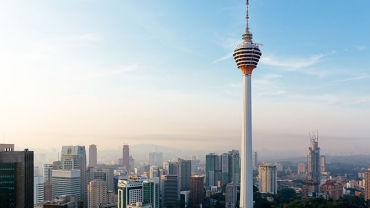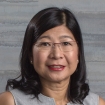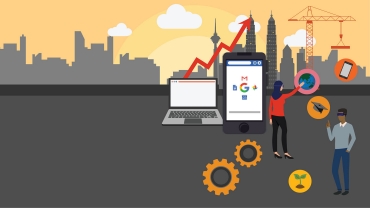
Making an impact
We’re only as strong as the communities in which we operate. So it makes sense for us to be responsible citizens, by supporting local communities with the skills and resources that we have.
We focus our efforts on two key areas: addressing inequalities in education and capacity building for both individuals and organisations. We also ensure that our initiatives are measurable, sustainable, and that we’re there for our beneficiaries for the long term. Besides playing a part to solve important problems, our people also benefit by learning new skills, gaining personal fulfillment and building deeper relationships with their community.
For most of 2020 and 2021, our community outreach programmes which relied on face-to-face interactions were severely affected by the Movement Control Order (MCO). We had to reimagine programmes in a virtual environment for beneficiaries with limited access to data and hardware. This resulted in the scaling down of some programmes i.e. such as the Community Outreach Programme (literacy) with fewer volunteers and a smaller pool of beneficiaries or postponing participation (Money & Me, a financial literacy programme for students). Both these programmes have the largest number of volunteers annually and this meant that many of our people couldn’t volunteer. This impacted our Global People Survey rating on the statement ‘PwC makes a positive change in the community’ which fell by 40%. Learning from this experience, we will be looking at the possibility of running virtual programmes which could be scaled up.
In 2020, the global network introduced the New World.New Skills initiative. We looked at what this meant forus and asked what were the needs of people and communities in this changing environment. During the MCO, we started running three programmes under our ‘Komuniti Digital’ initiative : Komuniti Guru Digital Learning+, Kampus Digital and the Applied Leadership Programme.
Read on to learn more about our Corporate Sustainability initiatives and programmes below and how they support the United Nations Sustainable Development Goals.
FY21 |
FY20 |
FY19 |
|
|---|---|---|---|
Number of volunteers |
257 |
389 |
462 |
Number of volunteering hours |
4,151 |
5,767 |
5,146 |
Donations & grants (RM) |
131,209 |
177,178 |
217,485 |
Number and opportunities to volunteer was scaled down in FY21 due to the COVID19 pandemic.
389
Volunteers
5,766
Volunteer hours
- 35 underprivileged children (31 COP and 4 Yayasan Chow Kit)
- 6 NGOs (3 COP homes, 3 Social Hero Foundation NGOs)
- 32 Social Enterprises
“Mentor was super helpful in addressing potential business development activities for the next few months. He listened to my pain points and offered some great insights in successfully implementing a fundraising campaign”
“Mentor helped look at problems from perspectives I didn’t think of, through the eyes of a customer, investor or government official”
We were involved in the upskilling of social enterprises through MaGIC's (Malaysian Global Innovation & Creativity Center) virtual platform that is designed to connect social innovators with subject matter experts or professionals in various areas for capacity building. We provided mentoring in areas including finance & and investment and business development/marketing.
MaGIC - Mentoring of social enterprises
|
Social hero foundation
Our team in Melaka saw an opportunity to provide upskilling and process improvement on data collection for selected non-profits who provide financial assistance to those from the lower income group. The objective of this programme is to help digitalise the databases of applicants and beneficiaries and train their people to monitor and analyse results.
The team set up a standardised survey to gather data from applications, consolidated details of 3,500 individuals, identified and removed duplicates across various non-profits and data visualisation using Power BI. The non-profits were guided on using these tools to help them to be self-sustaining in the future.
12
volunteers
700
hours
Community Outreach Programme (COP)
The COP is our longest running community programme which focuses on providing quality education for underprivileged children. Each volunteer from PwC dedicates two weeks of their time between June and October to tutor children at the 3 homes we support (Rumah Kebajikan Anbu Illam, Rumah Kebajikan Karunai Illam and Rumah Juara). Our volunteers help the children with homework in the English, Mathematics, Accounting and Bahasa Malaysia subjects. We measure our impact by tracking the children's non-academic progress (e.g. attendance, communication skills, independence) via evaluation forms filled in by the volunteers.
During the COVID-19 pandemic, we had to reimagine our educational support for the children. We discussed with the homes and decided that the focus will be on children who will be sitting for major examinations. Considering hardware, broadband and familiarity factors, we used WhatsApp to communicate with the students. While coaching and support were sufficient measures in the interim, we are currently looking at a long term project where we can contribute effectively to supporting education for all.
54
volunteers
1848
hours
Komuniti Digital
Upskilling teachers and students through Komuniti Digital (A ‘New world. New skills.’ initiative)
One of the pillars under our ‘New world. New skills.’ initiative, is to contribute to our communities so that we may do our part in narrowing the digital divide. Even before COVID-19, Malaysia’s youth were already at risk of getting left behind, as not all have access to upskilling opportunities. The pandemic further exacerbated the situation, with school closures and the shift to remote learning posing a challenge not just for underserved students but teachers as well.
We sought to address this through our ‘Komuniti Digital’ programmes, with two initiatives launched so far.
Komuniti Guru Digital Learning+ (KGDL+) | Collaboration with Arus Academy to upskill teachers
To upskill our youth, we recognised that we needed to go a little deeper for lasting impact. We needed to help strengthen the foundations of education, so we adopted the approach of upskilling teachers first. With this objective in mind, we collaborated with Arus Academy for their experience in designing education programmes, and launched KGDL+ on 29 June 2020.
As the pandemic had forced schools to move from physical classrooms to digital ones, the programme was built upon the understanding that teachers needed to be empowered to deliver effective lessons remotely. So over the course of four months, our cohort of 54 teachers learned how to make strategic use of various digital platforms through a series of virtual workshops. The goal: to strengthen the teachers’ creativity, resilience and critical thinking skills, and to encourage them to think of new ways they can consider adopting for better interaction and engagement with their students.
Up to six subjects* were covered in the KGDL+ programme, which was supported by the education state departments of Kedah, Perlis and Sarawak.
While Arus Academy drove the programme, we participated by facilitating several knowledge sharing sessions, and over 40 of our people volunteered to help the cohort of teachers build their lesson plans. This ranged from showing the teachers how to create more engaging presentation decks, to providing suggestions on how to simplify slides while ensuring the content doesn’t lose impact. Based on the feedback received, we learned that the time dedicated by our volunteers freed up some extra time for teachers to focus on teaching.
By the end of the programme in October 2020, over 1,000 learning materials were created, with 46 teachers ‘graduating’. The materials are currently saved in ‘Bank Sumber KGDL+’, a digital resource hub by Arus Academy that’s accessible to all teachers in Malaysia.
With the programme receiving positive feedback, we aim to support more of the nation’s teachers, and are exploring several paths we can take to sustain this endeavour.
*Matematik, Sains, Asas Sains Komputer, Reka Bentuk & Teknologi, Sejarah, and Geografi for Form 1 to Form 3.
46 teachers completed programme |
>1,000 learning materials created |
>40 PwC Malaysia volunteers |
Positive feedback from teachers |
Kampus Digital (upskilling undergraduates)
Based on a survey we ran among university students, we discovered that they didn’t feel as ready to enter the workforce, that rather than just studying the theory, they wanted more practical lessons that they could apply to real workplace tasks.
That finding was the genesis of our Kampus Digital programme. As employers ourselves, we know just how important digital skills and knowledge are, and we wanted to help students be as ready as possible to face the working world head-on.
As this was our first such programme, we kept it tightly focused, developing modules specifically for final year Accounting, Finance or Business students. Our first phase, which ran from January to February 2021, taught students from Multimedia University (MMU) advanced Excel skills and an elective course on the Malaysian Financial Reporting Standards (MFRS). Though the programme was relatively short, we saw some promising impact from the lessons delivered.
47 Bachelor of Accounting students from MMU completed the programme |
93% said they found the overall programme helpful |
Pre-programme, 11% were familiar with advanced Excel functions. Post-programme, the figure rose to 94%. |
14 volunteers (module content, virtual coaching)87.5 volunteering hours |
We broadened our scope for phase two (May-July 2021), opening the programme to two universities (Universiti Teknologi MARA [UiTM] and Universiti Tun Abdul Razak [UNIRAZAK]), and introducing new modules in addition to the lessons in phase 1. These included lessons on Microsoft PowerPoint and Digital Citizenship.
102 students completed the programme; 63 students from UiTM and 39 students from UNIRAZAK
|
100% said they found the overall programme helpful |
An increase of over 60% of students who scored higher than 80% across all 4 level 1 modules (spreadsheet) | 19 volunteers who were involved in creating content and virtual coaching 133 volunteering hours |
The modules for both phases were developed by volunteers from PwC Malaysia. To ensure that students really understood the materials, we also organised virtual coaching sessions that encouraged students to share any questions they might have with our volunteers. From the feedback we received, this played a pivotal role in helping the students clarify anything they didn't understand.
All students who completed the programme were awarded with a certificate, and a total of 3 students succeeded in securing an internship** with us. The low number of joiners was due to the timing of the programme and profile of participants (do not require an internship at that point). We have since improved on this during our third run of Kampus Digital which started in October 2021 through to December 2021. We will report the outcomes in our next report.
**We assessed students against PwC Malaysia’s standard criteria for internship positions.
Contact us


















